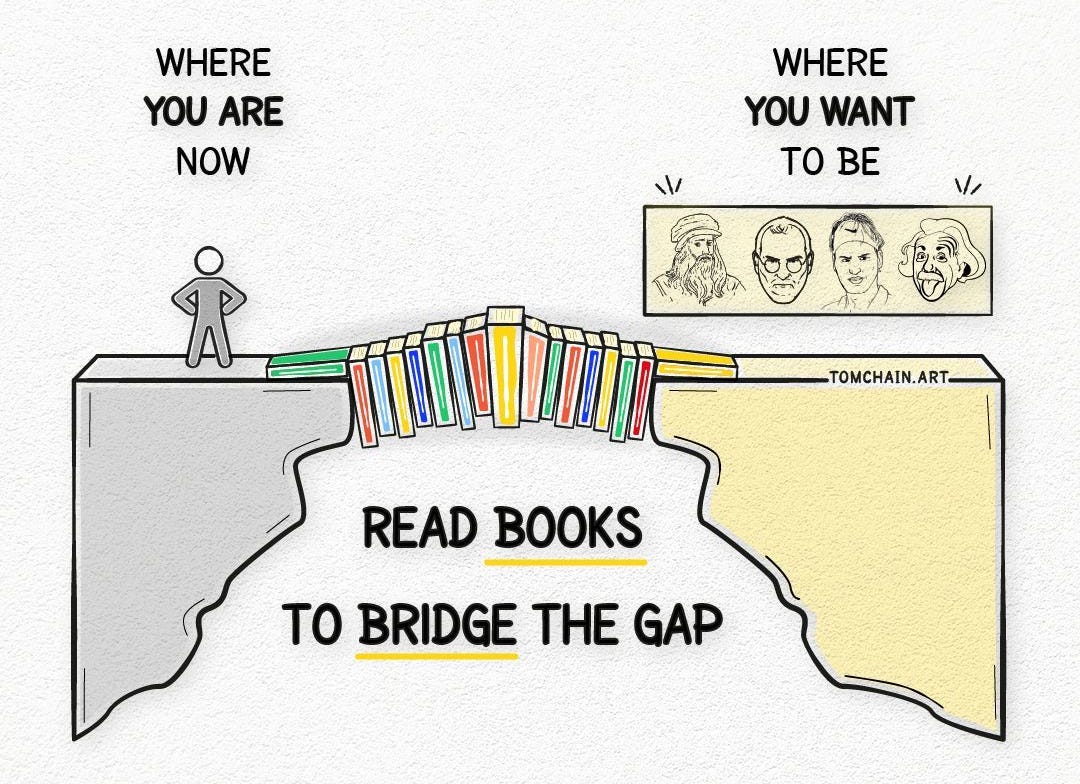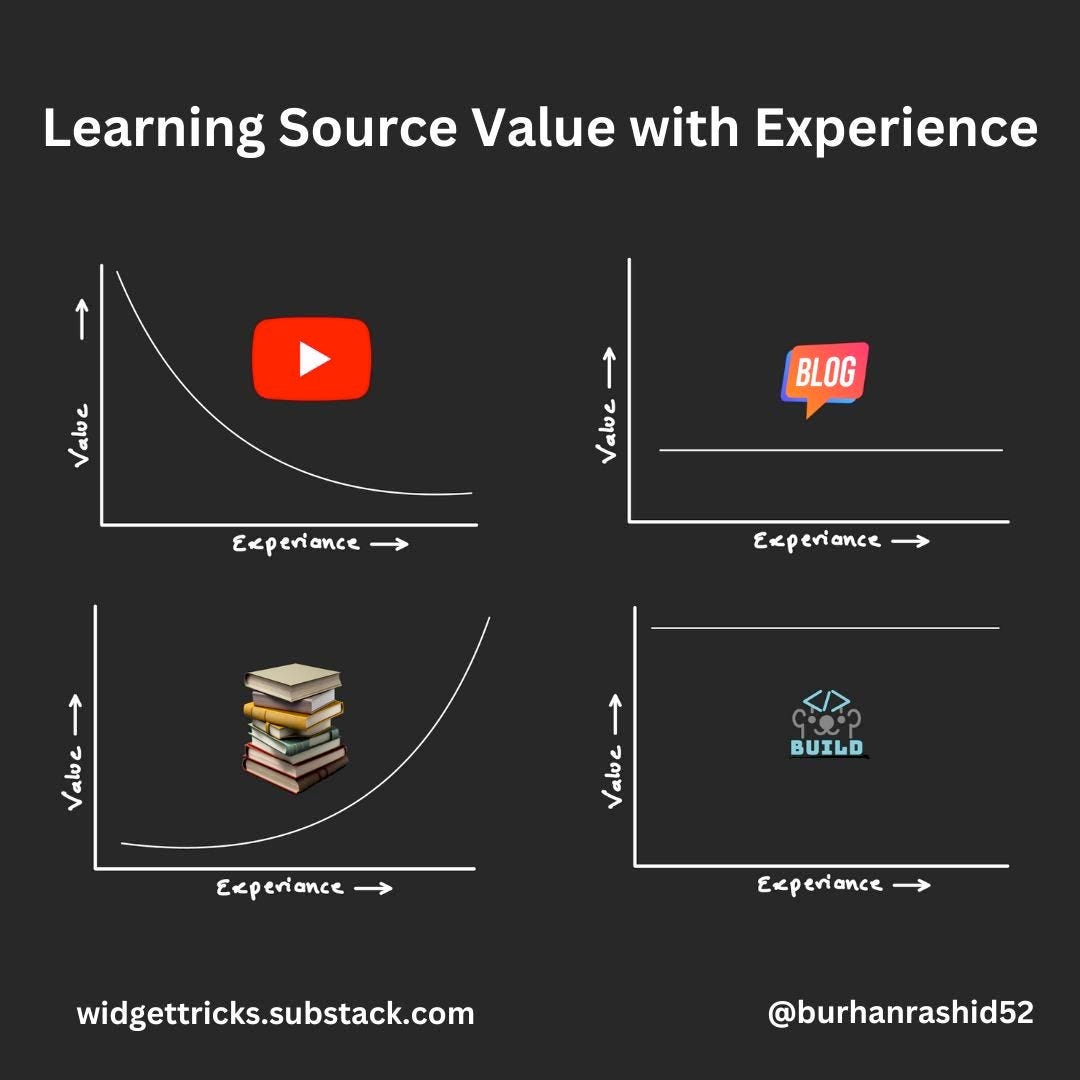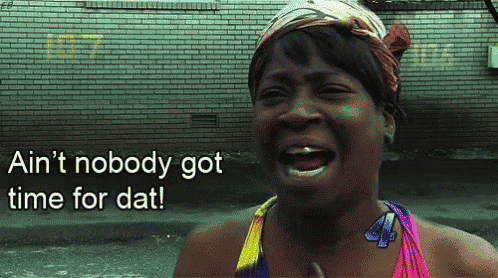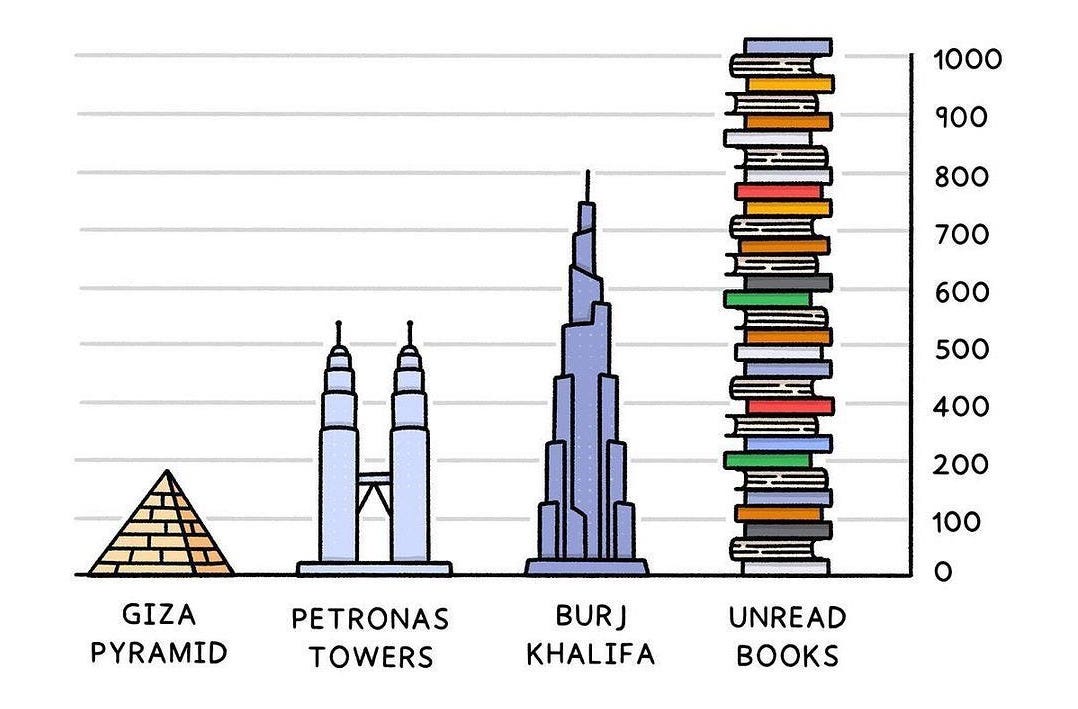Why Should You Read Tech Books in the 2025 AI Age
What’s the point of reading a tech book if I can get everything online for free? If it's so beneficial, then why isn’t everyone reading it? And How do I solve this problem and read more tech books?
It's January 2025, a time of year when gyms are full, dietitians are in high demand. Many goals and resolutions are made to improve yourself. If you are a programmer, especially if you are in the early stages of your career, then I would recommend adding "Reading tech books" at the top of your resolution list.
Note : By "Tech books," I mean timeless software concepts books (SOLID, cohesion, coupling, dependency management, testing, and separation of concerns) and NOT framework-related books (React, Android, Flutter, iOS, Spring Boot, and others).
Whenever I suggest someone to read books to up-skill themselves, their first question is...
1. What’s the Point of Reading a Tech Book if I Can Get Everything Online for Free?
1.1. Online Content Is Just Teaching You How to Use A Framework’s API.
Many developers think that books, official documentations, YouTube tutorials, and online courses are the same, but each serves a unique purpose.
YouTube and official documentation solve immediate problems, online courses teach you new skills systematically, and books are designed to offer long lasting value.
The majority of online content targets specific frameworks. They basically teach you how to install, build UI, perform CRUD operations, and deploy apps on devices/servers using framework APIs. 1
Their unique selling proposition (USP) is that they make the learning experience a lot better by adding anecdotes from their personal experiences, which they deserve to get paid for.
The problem is that we misunderstood this API learning as deep learning. All you know now is that there is a method/function/package that does what you want. What would you do if the task you want to achieve does not have a function in the API and there is no tutorial for it?
1.2. Shallow Knowledge vs Deep Knowledge.
YouTube, Official documentation, and StackOverflow solve an immediate problem. Once that is solved, we don’t bother much about how it fixes our issues or what’s going on under the hood. We often call this as the “Getting things done” approach.
And it's fine if this is just a one-off thing, something done in urgency. However, when this becomes a habit, it's a big problem. This creates a significant gap between shallow knowledge and deep knowledge, especially in terms of AI for beginners. This gap is widening at a faster rate now.
1.3. Tips and Tricks Does Not Build Knowledge.
This is specifically for short-form content. Although it works, it only provides surface-level shallow knowledge. Let me give you my real-life example.
When I was in the 10th grade, we had a profit-loss math question. Most students did not understand these questions, so the teacher gave us a hack that whenever we see the word "Total" in the question, we do an addition, and whenever we see the word “Left", we do a subtraction. Students were so happy and were able to solve all the questions in class.
However, in the final exams, we got a question that had both "Total" and "Left" words in the same question. Most students got confused and could not answer that question. They knew the hack and relied too much on it, and since they lacked a deep understanding of how profit-loss actually works, they could not answer the trick question.
So, tips and tricks work on predictable things, but as soon as the situation changes, they do not work. Tips and tricks give an illusion that we've learned something, but in the long run, understanding the deep concept is what matters most.
2. Okay... So, What Are the Actual Benefits of Reading Books?
2.1. Builds Mental Models
Make better decisions by using mental models.
- Charlie Munger
Reading books builds different mental models. But what exactly is a Mental Model? We can take an “AI model” as a perfect analogy here.2.
When I started building apps in Flutter, I developed the mental model of Declarative UI. Now I use the same model to build apps in React, Jetpack Compose, and SwiftUI with just some minor syntax differences.
Another example is that before I worked on the backend, I only knew about databases in terms of basic CRUD operations. However, when I read Designing Data-Intensive Applications, it opened up a lot of mental models for me regarding database design.
This allows me to think a little bit every time I design database schemas - where should I put validations? Should they be at the database level, REST API level, or frontend level?
Now I can use this mental model in any backend technology, regardless of the framework. 3
Working effectively with legacy code builds my mental model to write tests for any complex codebase.
Refactoring builds my mental model to change any existing design without worrying about breaking the existing codebase.
Test Driven Development by Kent Beck allowed me to write tests before production.
and Domain Driven Design allowed me to think in a domain first mode.
I could go on, but you get the point. You can follow me on Goodreads to stay up to date with my reading list.
2.2. Rich Vocabulary Leads to Clarity of Thoughts.
If you ask any senior developer for advice on how to improve as a developer, most of that advice falls under communication problems.
It's not that the programmers don't know their stuff. It's just that they can't express things well enough. And one of the reasons for this is that they don't have a rich tech vocabulary for their profession.
Javed Akhtar gave a really good analogy of "words" as bricks. The more bricks you have, the bigger house you can build. The more words you have, the better you can explain or express yourself.
Reading technical books will give you a rich tech vocabulary, which makes:
Your thinking and communication clearer.
Your arguments in PR are a lot better.
The documentation will be clearer.
Your variable naming will be far better.
You can sell ideas better to top management.
And you can lead more effectively.
2.3. Get the Mentor You Always Wanted.
When in doubt, I always thought, "I wish I had a senior or mentor like him/her. I would have learned a lot from them and could have avoided a lot of mistakes." And this is one of the most common answers I get from students when asked, "Why do you want to join my effectiveflutterdev classes?"
Now, each person has limited time. Hence, the chances of getting time from your mentor are tough, especially when the mentor is popular. But what if you could read all their experiences, mistakes, successes, and learnings from the books they wrote?
Additionally, you can get your doubts cleared by asking any questions related to their books to your mentor. Because authors are always looking for feedback 4. It's a win-win situation.
2.4. Become a Better Writer. The Most Essential Skill In the AI World.
In the software engineering world, as you climb the ladder with experience and expertise, you also need to be better at communicating your ideas through writing. I believe this skill will become really important in the AI age.
Why am I saying this? If you observe closely, AI has shortened the gap between input and output.
So now, the quality of the output is directly proportional to the quality of input. So for writing prompts, we need great writing skills. And to verify the output, we need expertise. Therefore, reading more books will expose you to a vast vocabulary and show you various ways to communicate and improve your input.
3. If Reading a Book Is So Beneficial, Then Why Isn’t Everyone Reading It?
3.1. I Don’t Have Time.
I don’t have time is the first thing developers say when I ask them to read tech books. The truth is, time is not the problem; it’s about setting the right priorities.
Developers can easily identify JIRA ticket priorities using p0, p1, p2 labels, but when it comes to self development, there are no priorities.
All you need is just 20 minutes per day, and if you say you can’t find 20 minutes a day to read, then there are bigger problems in your day-to-day life than reading books.
To me, it's just an excuse for not reading books. In Adlerian psychology 5, this means that the issue is not the time; the real issue is that you have set yourself a goal to NOT read books and use time as an excuse to fulfill that goal.
3.2. Attention Span
Attention is the new currency. Why ?. Because it’s becoming rare and rare is valuable.
Everyone is so distracted that they cannot focus on a task for more than 5 minutes. This is a big problem not only for reading books but for the whole knowledge worker industry.
Focus is what this generation lacks. They cannot stick to one thing for long. Whether it is reading books, jobs, relationships, commitments, or anything else.
The good news is that you can fix this by starting to read books. This will actually improve your attention span and Reading Stamina. It won’t happen in a day. In initial days your brain muscle will swell, just like how the body muscle swells in the gym during a workout before it gets into shape.
I won't stretch this section further since our attention span is low🤣. If you are looking for more concrete strategies, I would recommend reading Deep Work.
3.3 Short Term Thinking.
Short-term thinking is, "If I read this book today, then I should get the result NOW." If it doesn't help me today, then it's of no use. Hence, developers stop reading.
Reading books is a compounding activity, which is called the 8th wonder of the world. You won't see any results in the initial days, but once it starts to pick up, the results are so enormous that it just looks like a wonder.
My theory is that you need to read at least 8-10 books to spark one good idea. That one good idea will change your career or life.
4. Now I Get It. How Do I Solve This Problem And Read More Tech Books?
4.1. Treat It as a Lifestyle Change. Build a Habit.
Don’t treat reading a book as a goal, that is, if I read 10 books in a year then I am a reader. Rather, form this as a habit, because habits make reading effortless. Building a habit is a lifestyle and a long-term change. That's why most people fail at it. This is such a big challenge that Alex is running a business to solve the making reading a habit problem.
4.2. Read 10 Pages per Day
I've read dozens of self-help and habit-building books. One thing that worked for me was setting a target of reading 10 pages per day. The bar is so low that it's easy to achieve even on days when I don't feel like reading.
If you do the math:
Reading 10 pages per day => 365 days x 10 pages = 3650 pages in a year.
Let’s round it up to 3000 pages, in case you miss some days.
And let’s say an average technical book is 400 pages 6, then you will be able to read 3000/400 = 7.5 books each year.
And that’s a lot compared to nothing.
4.3. Drop the Book if You Find It Uninteresting.
There is a common meme that goes around in the reading community.
The biggest mistake I made when forming a reading habit was that I didn't buy a new book until I finished the current one. This has two problems:
You force yourself to read even if you don't like it, which leads to breaking the habit.
You cannot change books if you find another topic interesting.
Never stick to just one book at a time. Instead, I would suggest having 5-6 books from different domains at the same time. Ranging from topics like clean code, testing, project management, or even fiction 7.
Usually, having more unread books is a good thing. This keeps your interests broad, so that once you get bored of one topic, you can easily jump to another while maintaining your reading streak.
4.4. Take Action, Because Action Produce More Information
You cannot get six-pack abs by reading a fitness book. No matter how many online courses you take, articles you read, or YouTube videos you watch, or how many books you read, it won't matter until you move your finger and put it on the keyboard to write code yourself. Until then, nothing matters.
Whatever you read, try to apply it in your day-to-day work. Even if it fails, then it's fine, you will get more information on what to improve next time.
5. Conclusion
Online content is different from reading books. Reading books requires attention and your time for long-lasting value. There are a lot of software engineers in the market, but very few are good at their craft (ask people who are hiring), and all those who are good at their craft mostly read tech books.
Books will expose you to different ideas which you can apply to your day-to-day work. For me, this was a career-changing habit, hence I encourage everyone to do it.
Check out My Top Tech Book recommendations.
If you are a Flutter developer who wants to advance your Flutter skills, then I am currently running live classes called effectiveflutterdev.com. So if you are interested, then apply now.
You can follow me on YouTube, LinkedIn, Twitter, Instagram, and BlueSky.
Also, If you enjoyed this post, then would you be able to do me a quick favor and share my latest blog post with your friends and colleagues? I'd really appreciate it and I think it could be valuable to them.
Thank you!!
These courses are well presented and structured materials based on the majority of documentation already available (AI tools make it easier).
The analogy obviously works, since the core idea of AI derived from how brain neurons work.
It's also an opportunity to leverage AI for transferring knowledge to another domain
Books also go through a lot of research to verify the claims, which does not happen in the online content world.
The Courage to be disliked
Technical books tend to be bigger than self-help
Reading more fiction is my new year 2025 resolution












